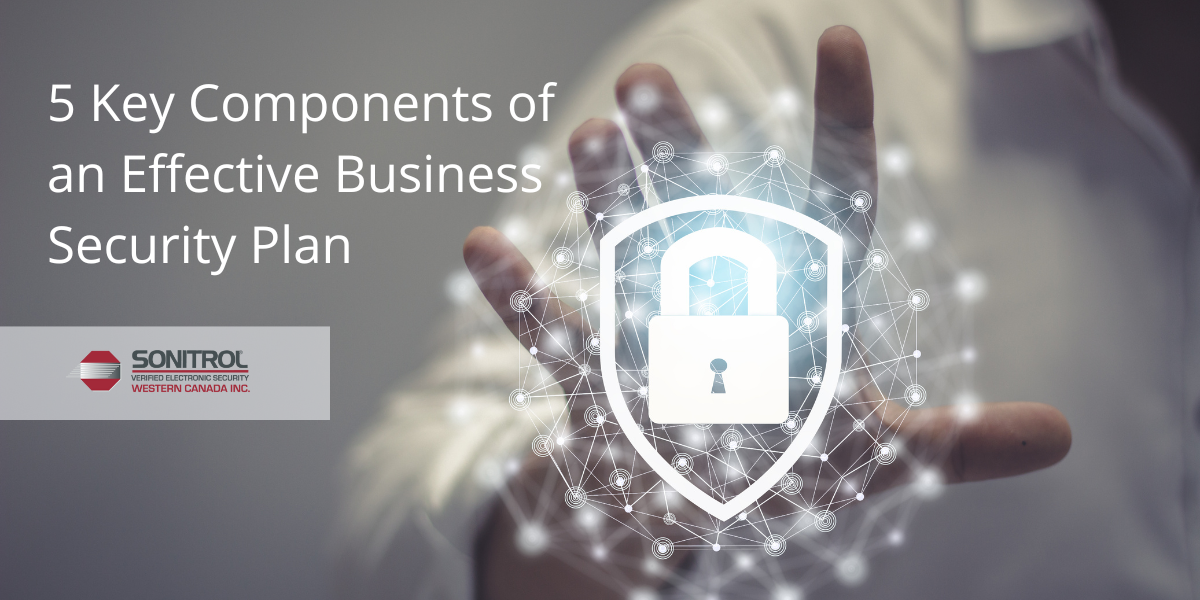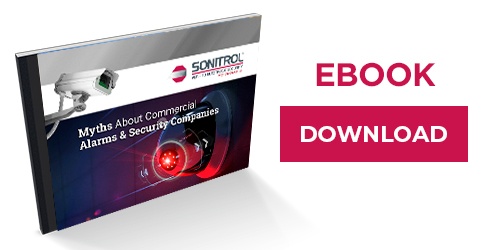5 Key Components of an Effective Business Security Plan

A security plan that doesn’t actively prevent threats is a liability. Criminals exploit gaps in weak systems, and reactive security won’t stop them. If you want real protection, you need a plan built to prevent, detect, and respond before damage is done.
In today’s world, businesses of all sizes face a wide range of security threats, from cyberattacks and data breaches to physical theft and employee sabotage. That’s why it’s crucial for companies to develop a comprehensive security solution that includes measures to protect their assets, employees, and customers.
An effective business security plan is one that includes a range of key components designed to address a wide range of security threats. While cybersecurity often dominates discussions, physical security is just as critical, and often overlooked. Without it, your business remains vulnerable to theft, vandalism, and other physical threats that can result in severe financial losses and operational disruptions.
To ensure you have an effective physical security plan, be sure to cover these critical areas:
1. Risk Assessment
The first step in developing a physical security plan is to conduct a comprehensive risk assessment. Most businesses underestimate their vulnerabilities, and many security providers fail to address key risks, like blind spots in surveillance, false alarms, or slow police response times.
A professional risk assessment should identify all potential threats to your business, from break-ins and employee theft to gaps in access control. This can be carried out by a third-party security consultant or an internal team. However, for the most effective assessment, businesses should rely on security experts with real-time threat verification capabilities, like Sonitrol.
2. Access Control
Access control is all about managing who can enter a business’s premises, equipment, and information. But traditional access control methods, like simple door locks and key cards, often fall short.
- Physical Barriers: Doors, gates, and perimeter fencing are essential, but alone, they won’t stop a determined intruder.
- Electronic Access Control: Card readers and biometric scanners provide better security, but criminals can still tailgate or use stolen credentials.
- Sonitrol’s Integrated Access Control: Unlike traditional systems, Sonitrol’s verified security integrates access control with real-time verified audio and video monitoring, ensuring any unauthorized entry is immediately detected and addressed.
3. Security Systems: The Power of Verified Alarms
Audio and video security is a critical component of physical security for any business. Conventional alarm systems rely on motion detectors and sensors, but without verification, 98% of alarms turn out to be false, leading to slow police response times.
When choosing a security system, be sure you are looking at verified security, which uses real-time audio and video surveillance to confirm that a security event is a genuine threat before dispatching a response.
When the alarm is triggered, a security professional determines if there is a true threat. If there is, they will contact the authorities. Because the crime is verified and updates are given in real-time, police respond faster and have higher apprehension rates, resulting in less loss and damage. If not, they reset the system without advising authorities, reducing costs associated with false alarms and dispatches.
Verified security systems are becoming increasingly popular due to their ability to reduce false alarms, improve response times, and provide a higher level of security for businesses. In fact, many police departments no longer respond to unverified alarms.
Sonitrol’s verified security changes the game:
- When an alarm is triggered, real-time audio and video verification confirms whether it’s a genuine threat before dispatching authorities.
- Police actually respond to Sonitrol’s verified alarms, responding in an average of 3.5 minutes, compared to 30+ minutes for unverified alarms - if at all.
- Criminals are caught in the act, resulting in more arrests and less loss or damage.
With Sonitrol’s verified security, false alarms are eliminated, police response times are dramatically improved, and businesses gain real protection, not just an alert.
4. Emergency Planning
Even with the most comprehensive security plan in place, it’s still possible that a security breach or incident will occur.
An incident response plan is a critical component of any business security plan. This component of the plan involves developing a clear and concise plan of action for responding to different incidents. This includes natural disasters, workplace violence, and other security incidents.
Your risk assessment will help determine which emergencies you need to cover. A strong emergency response plan should include:
- Incident response protocols for different scenarios.
- Clear communication channels for employees and emergency responders.
- Business continuity strategies to minimize downtime after an incident.
Sonitrol’s real-time monitoring ensures that in the event of a verified security threat, authorities are immediately alerted with live updates, helping your business to respond more effectively to crises.
5. Training and Education
While physical security measures, such as access control and security systems, can help to deter and detect threats, well-trained and educated employees can be the first line of defence against potential security breaches. That’s why a comprehensive security plan should include training and education for all employees.
A comprehensive security plan should include ongoing security education covering:
- Access Control Protocols: Employees must understand how to properly secure entry points and recognize tailgating attempts.
- Emergency Procedures: Training on how to handle security threats, from fires to armed intrusions.
- Suspicious Activity Awareness: Employees should know what signs to look for and how to report security concerns.
To help employees stay up-to-date on the latest security threats and best practices, be sure that security and safety training is an ongoing initiative.
Protect Your Business With Proactive Security
Having an effective security plan for your business is critical to the safety of your property, your staff, your customers, and your overall reputation. But not all security systems are created equal, reactive security leaves you vulnerable, while verified security prevents crime before it happens.
Sonitrol provides expert-led security solutions designed to deter crime, reduce false alarms, and ensure rapid law enforcement response.
Stop crime before it impacts your business. Get a free security plan from Sonitrol today and experience the power of verified security.
Tags:
Commercial SecurityMarch 03, 2025






.svg)
